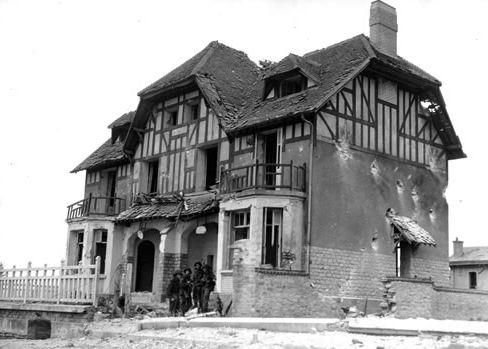With all the ceremonies and wreath laying up and down the Normandy coast this week, the commemoration of the 70th anniversary of D-Day is, quite rightly, a solemn and respectful occasion.

But there’s another emotion, a surprising feeling, that I’ve been fortunate to experience here – joy.
WATCH: D-Day 70th Anniversary: Leaders and veterans gather in Normandy
Even seven decades later, there is so much generosity and hospitality towards Canadians in Normandy, it’s hard not to be swept away by the affection of the locals.
Nowhere is this gratitude greater than at the summer home of Herve and Nicole Hoffer in Bernières-sur-Mer.
For decades the couple has kept a shrine to the Canadian soldiers who liberated their family home, the first building on the Normandy coast taken by the Allies on D-Day.

“If Canadians hadn’t landed in June 1944,” says Herve, “I might not be here to say thank you to the Canadian people.”
Herve’s grandfather bought the home before the war but the family was evicted in 1942, two years after the Nazi’s conquered France.
The large timber home, seen in the background of countless D-Day photos, miraculously survived the Allied bombardment.
The building became a landmark for wave after wave of Canadian troops flooding into France and was a hub for operations immediately following the invasion.
“Most of the German prisoners of war who were brought to that area were counted and catalogued right at that spot, ” says historian Ted Barris.
Because of the house’s historic role, thousands of people visit each year.
And everyone, especially if they are Canadian, is taken in and treated like family.

When we arrive for our interview, we are immediately introduced to a group of Canadians already enjoying lunch at the Hoffer dinning room table.
Before we do any work, we must take a chair and have some cake and coffee.
“Canadians gave us our liberty,” says Herve’s wife Nicole, “that’s what make us want to do this.”
Sitting across from me is Stephanie and Jeremy Leblanc. They’re a young couple from Ottawa who work preserving Canadian battlefields in Europe.
They have been visiting the Hoffers for years. In fact, they come over so often, they suspect their 4-month old baby Charlotte was conceived in Normandy.

“She has a middle name of Juno – named after Juno Beach,” says Stephanie.
It’s not just the Hoffers who offer up family-style hospitality. It’s everywhere, just like the Canadian flags. A Canadian visitor here is akin to being a minor celebrity.
In the supermarket checkout line, an old French woman, perhaps twice my age, begins to flirt with me when she hears my Canadian accent.
“There are so many Canadians here!” she exclaims in French, “But you are too young for me,” she teases with a laugh.
She shows me her necklace that has a tiny silver inuksuk attached at the end of it.
READ MORE: Mapping Canada’s D-Day dead
“A woman from Canada gave this to me when I invited her to lunch,” says the French woman proudly.
I smile and compliment her on the fine looking jewelry. But I have to race off to finish my story.
Back at the Hoffer home, veteran 89-yar old Ted Emmings shows up to a warm embrace from Nicole.
“How are you!” she cries, forgetting our interview and greeting Ted like a long lost brother.
There is so much affection and gentleness around me. Maybe because this is likely to be the last big anniversary with so many D-Day veterans now into their 90s.
- What is a halal mortgage? How interest-free home financing works in Canada
- Capital gains changes are ‘really fair,’ Freeland says, as doctors cry foul
- Ontario doctors offer solutions to help address shortage of family physicians
- Canada will take bigger economic hit than U.S. if Trump wins election: report
Ted tells me how he piloted a landing craft carrying the first wave of Canadians onto Juno Beach just in front of the Hoffer house. They were soldiers from the Toronto regiment, The Queens Own Rifles, which suffered 100 casualties in the first few minutes of the invasion.
“Two yards up the beach and they were shot. And you think, that guy is never going to go home,” he said quietly.
There is no sense of heroism in Ted’s voice. Just the understanding that he had a job to do, and that it was a damn shame to see so many people die.
“A waste of life, so many young guys,” he says.
Normandy is hallowed ground. But for those who survived it’s personal. It’s human. It’s tender.
Ted gently strokes his palm on Nicole Hoffer’s face as they bid adieu.
Outside, Herve walks along the beach with me. He explains his sense of duty. And says how his family home has become a kind of religious symbol.
“Another D-Day veteran came to my house one day,” he says. “But this time after visiting, the vet walked onto the beach and fell to his knees.”
“He took a handful of dry sand to his face and began to cry into the sand.”
“And when he took his hands away, the grains of sand had stuck to the tears on his face.”
Herve pauses.
“I helped him up. And we fell into each other’s arms. And I cried as much as he did.”
“This is my house.”


Comments